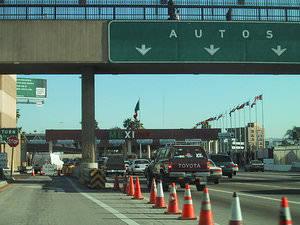The Deep Reach of Mexico’s Most Powerful Drug Cartel
Drugs have been flowing from Mexico into the US through various veins for decades, but in the last few years the U Drug Enforcement Administration has looked closely at the Sinaloa drug cartel, one of the largest distributors and Mexico's most powerful organized crime group.
Drugs have been flowing from Mexico into the U.S. through various veins for decades, but in the last few years the U.S. Drug Enforcement Administration has looked closely at the Sinaloa drug cartel, one of the largest distributors and Mexico’s most powerful organized crime group.
A series of stories by the Los Angeles Times captured the detailed narrative that emerged from the DEA investigations and from interviews with cartel employees who were convicted as a result of the investigation. The picture is one of a thriving, multibillion-dollar industry, snaking its way from drug lord to drug users in the far corners of the U.S. –BF
Your support matters…Los Angeles Times:
Smugglers were your next-door neighbor, the guy ringing you up at Wal-Mart, the big tipper at Applebee’s, the old friend at your high school reunion.
Lopez was friends with a man named Sergio Kaiser, who had married into his family. Kaiser said he owned a body shop, but his tastes seemed too flamboyant for that. He was building a house with a grand staircase modeled on the mansion in the movie “Scarface.”
In reality, Kaiser was Cuevas’ top lieutenant, and he told Lopez he could help him with his money troubles. There were several possibilities.
For a night’s work driving a load car from Mexicali to Los Angeles, a driver shared $5,000 with his recruiter and got to keep the car.
Another entry-level position was as a lookout. One kind of lookout followed the load car from the stash house in Mexicali to the border. Another stood watch at the port of entry and reported when the car had cleared customs. Yet another tailed the load car up the freeway to Los Angeles.
Lopez accepted Kaiser’s offer. Being a lookout was harmless, he figured: Just stand there and watch a car cross the border. “[He] didn’t say it involved drugs, but I knew,” Lopez said. “I thought, ‘What’s the big deal?’“
Independent journalism is under threat and overshadowed by heavily funded mainstream media.
You can help level the playing field. Become a member.
Your tax-deductible contribution keeps us digging beneath the headlines to give you thought-provoking, investigative reporting and analysis that unearths what's really happening- without compromise.
Give today to support our courageous, independent journalists.






You need to be a supporter to comment.
There are currently no responses to this article.
Be the first to respond.